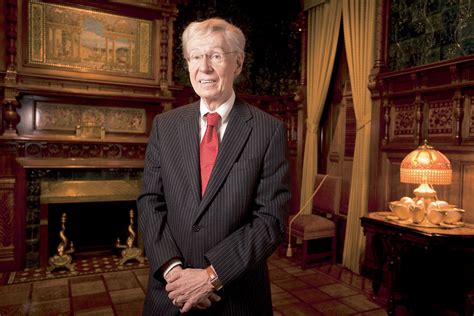A Quote by Benjamin Graham
The reader can test his own psychology by asking himself whether he would consider, in retrospect, the selling at 156 in 1925 and buying back at 109 in 1931 was a satisfactory operation. Some may think that an intelligent investor should have been able to sell out much closer to the high of 381 and to buy back nearer the low of 41. If that is your own view you are probably a speculator at heart and will have trouble keeping to true investment precepts while the market rushes up and down.
Quote Topics
Able
Asking
Back
Been
Buy
Buying
Closer
Consider
Down
Heart
High
Himself
His
Intelligent
Investment
Investor
Keeping
Low
Market
May
Much
Nearer
Operation
Out
Own
Psychology
Reader
Retrospect
Satisfactory
Sell
Selling
Should
Should Have
Should Have Been
Some
Test
Think
Trouble
True
Up
Up And Down
View
Whether
While
Will
Would
Your
Related Quotes
The most realistic distinction between the investor and the speculator is found in their attitude toward stock-market movements. The speculator's primary interest lies in anticipating and profiting from market fluctuations. The investor's primary interest lies in acquiring and holding suitable securities at suitable prices. Market movements are important to him in a practical sense, because they alternately create low price levels at which he would be wise to buy and high price levels at which he certainly should refrain from buying and probably would be wise to sell.
We are convinced that the intelligent investor can derive satisfactory results from pricing of either type (market timing or fundamental analysis via price). We are equally sure that if he places his emphasis on timing, in the sense of forecasting, he will end up as a speculator and with a speculator's financial results." And "The speculator's primary interest lies in anticipating and profiting from market fluctuations. The investor's primary interest lies in acquiring and holding suitable securities at suitable prices.
Here’s how to know if you have the makeup to be an investor. How would you handle the following situation? Let’s say you own a Procter & Gamble in your portfolio and the stock price goes down by half. Do you like it better? If it falls in half, do you reinvest dividends? Do you take cash out of savings to buy more? If you have the confidence to do that, then you’re an investor. If you don’t, you’re not an investor, you’re a speculator, and you shouldn’t be in the stock market in the first place.
The hardest thing over the years has been having the courage to go against the dominant wisdom of the time to have a view that is at variance with the present consensus and bet that view. The hard part is that the investor must measure himself not by his own perceptions of his performance, but by the objective measure of the market. The market has its own reality. In an immediate emotional sense the market is always right so if you take a variant point of view you will always be bombarded for some time by conventional wisdom as expressed by the market.
The investor has the benefit of the stock market's daily and changing appraisal of his holdings, 'for whatever that appraisal may be worth', and, second, that the investor is able to increase or decrease his investment at the market's daily figure - 'if he chooses'. Thus the existence of a quoted market gives the investor certain options which he does not have if his security is unquoted. But it does not impose the current quotation on an investor who prefers to take his idea of value from some other source.
The most common mistakes were investing in money market funds by people who were so scared at the prospect of managing their own funds that they picked the most conservative option, and their investments did not keep up with inflation. The second major mistake was being too heavily invested in their own company's stock, and buying when it was high and there was a lot of optimism about the company, and then having to sell it low when the company got in trouble.
Some may say [journal keeping] is a great deal of trouble. But we should not call anything trouble which brings to pass good. I consider that portion of my life which has been spent in keeping journals and writing history to have been very profitably spent. - "If there was no other motive in view [except] to have the privilege of reading over our journals and for our children to read, it would pay for the time spent in writing it.
What do you think would happen if we kissed right here, right now?" he asks, digging his hands into the pockets of his khaki pants, grinning right back at me. "I think it would cause a riot." "Well, you know me," he says, lowering his head towards me. "Causing a riot is what I do best." Santangelo approaches before Griggs gets any closer and pulls him away. "Are you guys insane?" he says, irritated. "It's called peaceful coexistence, Santangelo. You should try it and if it works we may sell the idea to the Israelis and Palestinians," I say, throwing his own words back at him.
No matter how low down you are; no matter what your disposition has been; you may be low in your thoughts, words, and actions; you may be selfish; your heart may be overflowing with corruption and wickedness; yet Jesus will have compassion upon you. He will speak comforting words to you; not treat you coldly or spurn you, as perhaps those of earth would, but will speak tender words, and words of love and affection and kindness. Just come at once. He is a faithful friend - a friend that sticketh closer than a brother.
The individual investor should act consistently as an investor and not as a speculator. This means ... that he should be able to justify every purchase he makes and each price he pays by impersonal, objective reasoning that satisfies him that he is getting more than his money's worth for his purchase.































